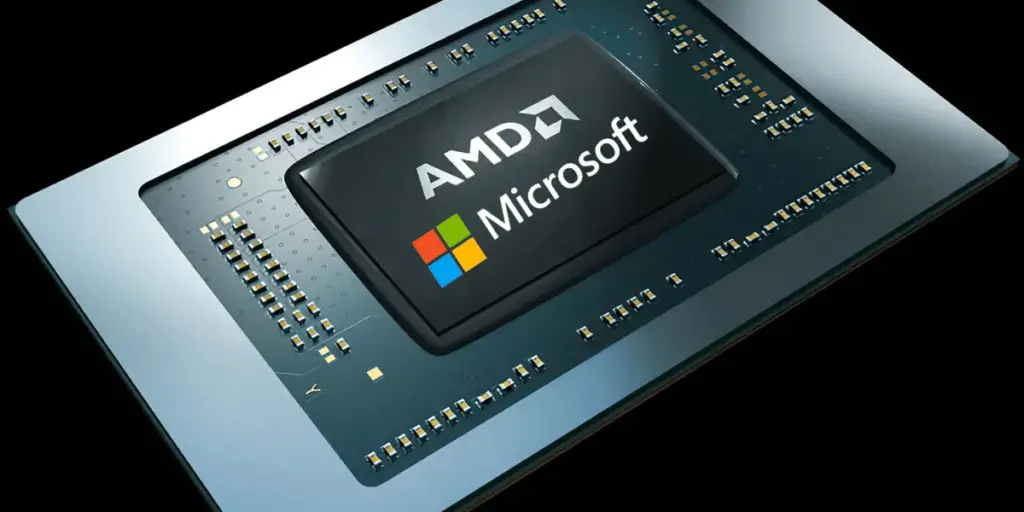Cybersecurity has become a paramount concern for individuals and corporations alike. As cyber threats grow more sophisticated, the need for advanced protective measures has led to the development of specialized hardware components known as “secure enclaves.”
These critical components are designed to safeguard the most sensitive parts of a computer system, acting as fortified sanctuaries that resist tampering and unauthorized access.
Secure enclaves establish a “root of trust,” performing cryptographic verifications to ensure that the system’s core has not been compromised by malicious actors.
leading tech companies like Intel, AMD, and Qualcomm have pioneered their own versions of these security measures, each aiming to fortify their hardware against escalating threats. A groundbreaking collaboration is now underway, marking a significant shift in the landscape of computer security.
Microsoft, a titan in the software industry, has joined forces with Intel, AMD, and Qualcomm to develop a new secure chip known as the Pluton Security Processor.
This initiative promises to bring enhanced security to a vast number of Windows users, integrating state-of-the-art protection directly into the hardware of future computing devices.
Through this collaborative effort, Microsoft and its partners aim to lay a new foundation for secure computing, ensuring that users can navigate the digital world with greater confidence and protection.
Background on Secure Enclaves
Secure enclaves represent a cornerstone of modern computer security, providing a dedicated hardware component that is isolated from the rest of the computer system.
This isolation ensures that sensitive data and operations are protected from unauthorized access, even if other parts of the system are compromised.
Secure enclaves serve a critical function in establishing a “root of trust”—a fundamental set of trusted tasks upon which the security of the entire system is built.
Secure enclaves are specialized areas within a processor designed to execute and store sensitive data and operations securely. They operate independently from the main operating system, creating a secure environment that is resistant to external attacks.
This isolated environment ensures that cryptographic keys, personal data, and other sensitive information are stored and processed in a way that is inaccessible to unauthorized users and software, including malware.
A “root of trust” is an essential component of computer security, providing a trusted foundation from which all secure operations begin. It involves a set of hardware, firmware, and software components that perform critical security functions such as secure boot, secure storage, and cryptographic operations.
By establishing a root of trust, secure enclaves can verify that the system’s firmware and software have not been tampered with, ensuring that the system boots and operates securely.
Historically, tech giants like Intel, AMD, and Qualcomm have each developed their proprietary secure enclave technologies. Intel introduced Software Guard Extensions, AMD designed the Platform Security Processor, and Qualcomm created the Secure Execution Environment.

Each of these technologies offers a unique approach to creating a secure enclave. Still, they all share the common goal of enhancing the security of their respective hardware platforms.
Intel’s SGX, for example, allows developers to create protected areas in their applications’ memory that are designed to be impenetrable by any code not authorized to access them.
AMD’s PSP integrates a dedicated security processor into the CPU itself, providing hardware-based security features. Qualcomm’s SEE, on the other hand, leverages the ARM TrustZone technology to create a secure operating environment that can run alongside the main operating system.
Pluton Security Processor
The Pluton Security Processor is a groundbreaking initiative by Microsoft. It was developed in collaboration with Intel, AMD, and Qualcomm to create a unified and highly secure chip that enhances the security of Windows devices.
Unlike traditional secure enclave technologies that operate as separate entities within the system architecture, Pluton is designed to integrate directly into the CPU.
This integration aims to eliminate potential vulnerabilities that could be exploited in the communication between the CPU and a separate security processor, thus providing a more seamless and secure computing experience.
The development of the Pluton Security Processor is the result of a collaborative effort that leverages Microsoft’s expertise in software and security, along with the hardware design and manufacturing capabilities of Intel, AMD, and Qualcomm.
This partnership is indicative of the tech industry’s recognition of the need for a more integrated approach to hardware security, especially in an era where threats are becoming increasingly sophisticated and pervasive.
The primary objective of the Pluton Security Processor is to enhance the security of Windows devices by providing a comprehensive security solution that is deeply integrated into the hardware.
Pluton establishes a hardware-based root of trust that ensures the integrity of the system’s firmware and the operating system, protecting against firmware vulnerabilities and unauthorized access attempts.
The processor is equipped to handle advanced cryptographic operations, providing robust encryption and secure identity management capabilities.

Pluton can receive security updates directly from Microsoft, ensuring that the security features are always up to date without relying on the device manufacturer or the end-user.
Designed to resist sophisticated physical attacks, Pluton secures sensitive data even if an attacker has physical access to the hardware.
The integration of the Pluton Security Processor into future CPUs promises to significantly elevate the security standards of Windows hardware.
Pluton aims to protect users from a wide range of cyber threats, including sophisticated malware and ransomware attacks, by providing a more secure computing environment.
The processor’s ability to receive direct updates from Microsoft addresses the challenge of fragmented security updates, ensuring that all devices equipped with Pluton remain protected by the latest security patches.
Technical Insights into Pluton
The Microsoft Pluton Security Processor embodies a significant leap forward in the realm of hardware security, aiming to establish a new benchmark for protecting sensitive computer operations and data.
This initiative, rooted in a partnership between Microsoft and leading chip manufacturers like Intel, AMD, and Qualcomm, integrates advanced security features directly into the central processing unit of Windows devices.
One of the hallmark features of the Pluton Security Processor is its integration directly into the CPU. This design choice marks a departure from traditional approaches where secure enclaves operate as separate entities within the system architecture.
By embedding Pluton within the CPU, it mitigates the risk of attacks exploiting the communication channel between the CPU and an external security processor, offering a more fortified security posture.
At the core of Pluton’s architecture is a hardware-based root of trust, which is fundamental to its operation. This root of trust provides a secure foundation for the entire system, ensuring that the boot process is secure and tamper-resistant from the outset.
It verifies the integrity of the system’s firmware and operating system during the boot process, safeguarding against unauthorized modifications that could compromise security.

Pluton is designed with sophisticated cryptographic capabilities to secure data and communications. It supports a wide range of encryption standards and protocols, enabling secure storage of encryption keys, user credentials, and other sensitive information.
These cryptographic functions are critical for secure identity management, data protection, and secure communication channels, ensuring that only authorized users and processes can access protected resources.
A unique aspect of Pluton’s design is its ability to receive security updates directly from Microsoft, bypassing traditional firmware update mechanisms that can be slower and less secure.
This feature ensures that the security processor remains up-to-date with the latest protections against emerging threats.
By streamlining the update process, Pluton reduces the window of vulnerability that attackers could exploit, maintaining a robust defense against evolving cybersecurity challenges.
Pluton is engineered to be resilient against physical tampering and sophisticated side-channel attacks.
These attacks, which exploit indirect information like power consumption or electromagnetic emissions to extract sensitive data, are increasingly common and challenging to defend against.
Pluton’s design includes specific countermeasures to protect against such threats, ensuring the security of data even in the face of advanced attack techniques.
While companies like Intel, AMD, and Qualcomm have developed their secure enclave technologies, such as Intel SGX, AMD PSP, and Qualcomm SEE, Pluton’s direct integration into the CPU offers a more unified and potentially more secure approach.
Unlike these separate enclaves, Pluton’s design minimizes potential vulnerabilities between the CPU and the security processor, offering a tighter security integration.
Windows Hardware Security
The advent of the Microsoft Pluton Security Processor, developed in collaboration with industry giants such as Intel, AMD, and Qualcomm, marks a transformative step in the evolution of Windows hardware security.
This integrated approach to embedding security directly within the CPU architecture not only signifies a shift in hardware design philosophy but also has far-reaching implications for the security ecosystem of Windows devices.
The Pluton Security Processor sets a new, higher standard for the security baseline of Windows devices.
By integrating security at the chip level, Pluton provides a more robust defense against a wide array of threats, including sophisticated firmware attacks that have become increasingly prevalent.
This means that every Windows device equipped with Pluton inherently benefits from a stronger, more impenetrable layer of security, raising the bar for what users can expect in terms of data protection and system integrity.
A notable advantage of the Pluton architecture is its ability to directly receive security updates from Microsoft, bypassing traditional firmware update channels that can be slow and inconsistent.
This direct update mechanism ensures that security patches are applied more swiftly and reliably, reducing the window of vulnerability to new threats.
For enterprises and consumers alike, this translates to simplified security management and enhanced protection against emerging cybersecurity risks.
Pluton’s design includes specific measures to counteract physical and side-channel attacks, offering a level of protection that was previously difficult to achieve.
For high-security environments and devices that may be exposed to sophisticated attackers, this means an added layer of assurance that sensitive information remains secure, even in the face of direct physical access to the hardware.
The collaboration between Microsoft and chip manufacturers like Intel, AMD, and Qualcomm in developing Pluton reflects a move towards a more unified and standardized security model for Windows devices.
This harmonization can facilitate greater compatibility and security consistency across different hardware platforms, benefiting developers, manufacturers, and end-users by simplifying the security landscape of Windows devices.
While the integration of Pluton into Windows hardware presents numerous advantages, it also raises considerations regarding user control and repairability.
The move towards a more centralized security model may prompt discussions about the balance between security and user autonomy, especially in contexts where users require the ability to modify their hardware or software configurations.
Consumer Perspectives
The introduction of the Microsoft Pluton Security Processor, developed in collaboration with leading chipset manufacturers like Intel, AMD, and Qualcomm, is poised to significantly impact the tech industry and its consumers.
This innovative approach to enhancing Windows hardware security through a deeply integrated security processor reflects a pivotal shift in how cybersecurity measures are implemented at the hardware level.
The tech industry, particularly companies focused on hardware and software development, is likely to view the Pluton Security Processor as a welcome advancement. With cyber threats becoming increasingly sophisticated, a more robust and integrated approach to security is crucial.
Industry players may appreciate the potential for Pluton to set new standards in hardware security, driving innovation and encouraging the adoption of more secure computing practices across the board.
Manufacturers and OEMs are expected to adapt their product designs to incorporate the Pluton Security Processor, aligning with the evolving security needs of consumers and businesses. This shift may necessitate changes in the manufacturing process but is seen as a step forward in creating more secure and trustworthy devices.
The collaborative effort behind Pluton between Microsoft, Intel, AMD, and Qualcomm could pave the way for further partnerships within the tech industry.
This collaborative model may inspire similar initiatives to tackle other pressing technological challenges, fostering a spirit of innovation and cooperation.
Consumers are becoming increasingly aware of cybersecurity risks and the importance of protecting personal information.
The Pluton Security Processor’s promise of enhanced security features directly integrated into the CPU is likely to resonate with consumers, offering them peace of mind and a more secure computing experience.
Pluton’s direct update mechanism, which allows security updates to be delivered straight from Microsoft, is another aspect that could appeal to consumers.

This feature simplifies the process of keeping devices secure, eliminating some of the complexities and frustrations associated with traditional update mechanisms.
While the security benefits of Pluton are clear, some consumers and advocacy groups may raise concerns regarding repairability and user autonomy.
Pluton’s integrated nature could make it more challenging for users to modify or repair their devices, sparking a debate about the balance between security and the right to repair.
Final Thoughts
The Microsoft Pluton Security Processor stands as a landmark development in the realm of computer security, heralding a new era of integrated, hardware-based defenses for Windows devices.
This collaborative effort between Microsoft and leading chip manufacturers—Intel, AMD, and Qualcomm—signals a profound shift towards embedding security at the core of the computing experience, fundamentally redefining the security landscape for the better.
From the industry’s perspective, Pluton represents an evolutionary leap forward, encouraging a holistic approach to security that seamlessly blends hardware and software solutions.
It challenges manufacturers and developers alike to elevate security standards, fostering innovation and potentially setting a new benchmark for what constitutes secure computing in the digital age.
For consumers, the Pluton Security Processor promises a future where enhanced security is not just an optional feature but a foundational element of every Windows device.
It simplifies the complexities surrounding security management, offering users a more secure, reliable computing experience while addressing the growing concerns over cyber threats and data privacy.
However, the journey towards universally integrated hardware security, as exemplified by Pluton, is not without its challenges.
Questions regarding repairability, user autonomy, and the balance between security and convenience remain critical considerations.
The tech community, alongside consumers, must navigate these issues thoughtfully, ensuring that the advancements in security do not come at the expense of user rights or the broader ethos of an open, accessible computing environment.
As the Pluton Security Processor begins its integration into the next generation of CPUs, its impact on the industry and its reception by consumers will undoubtedly influence the direction of future developments in hardware security.
The collaborative spirit behind Pluton’s creation could inspire further partnerships and innovations, driving the tech industry towards more secure, resilient, and trustworthy computing solutions.
Pluton Security Processor marks a pivotal moment in the ongoing battle against cyber threats, offering a glimpse into a future where enhanced security is inherently woven into the fabric of our digital lives.
As we move forward, the principles guiding the development and implementation of Pluton will be instrumental in shaping the security standards of tomorrow, promising a safer, more secure digital world for all.


